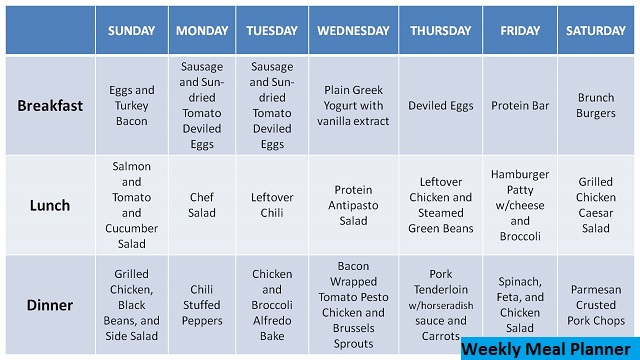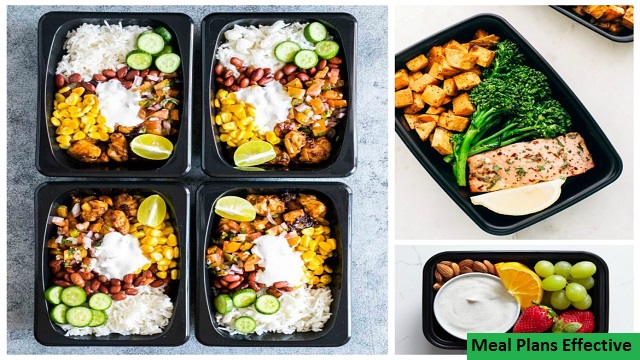
Are Weekly Meal Plans Valuable?
The cute “bikini diet” meal plan images and PDFs that you can download from Pinterest probably come to mind when you think of plans. Additionally, you might consider plans for bodybuilding, chicken and rice eaten five times per day, or those that your favorite fit influencer promotes on social media.
The more important query here, however, and the one we’ll tackle in this article, is whether or not weekly meal plans are worthwhile—by worthwhile, we mean that they’re worth the time, money, and effort you put into them in order to reach your objectives. Or, is there a superior option.
Many of us are looking for ways to simplify our routines as home cooking overtakes eating out, delivery, and takeout. If you want to plan your meals for the week, keep track of the groceries and specific ingredients you’ll need, and generally feel more motivated to take control of your nutrition, consider investing in a meal prep planner rather than winging it and ending up unprepared.
Dr. Adrienne Youdim, an internist with expertise in clinical nutrition and medical weight loss, says that even though we often have the best of intentions, we don’t always follow through on them when life gets busy. She is also the author of Hungry for More: Stories and Science to Inspire Weight Loss from the Inside Out.
You know the feeling—you’ve had a long day and are too tired to even consider making a healthy meal when you get home. Rather (and we’ve all done it), you start shoving spoonfuls of peanut butter into your mouth like it’s soup. Dr. Paul Goodman, chief medical officer at Fresh N Lean, asserts that approaching mealtime without a plan is risky business.
Your hypothalamus is telling you that those potato chips look so good even though your stomach is empty, your blood sugar is low, and you have low energy. You can rely on your judgment from before you were influenced by all those hungry hormones and brain signals by having a planned meal. ”
Meal planners are a smart investment because cooking at home can save you up to 90% on eating out, according to research by Forbes and NPD, and because Americans chose to cook 82 percent of their meals at home during the pandemic with no signs of that trend slowing down.
A meal plan: What Is It?
When you have a meal plan for the coming week, you can organize your meals in advance. An ideal weekly meal plan would include snacks, pre- and post-workout meals (if that is a part of your lifestyle), as well as your preferred eating occasions, foods, and meals.
By making a plan for the coming week, you can lay out your grocery list, estimate how long it will take you to shop and prepare your meals, have grab-and-go meals ready throughout the week, and even save money. A plan is essentially a weekly menu. Let’s get into it, shall we, how to go, and if so, what are the other options.
Meal plans: Who Are They For?
People who want more structure and direction in their dietary lifestyle for the coming week can benefit greatly from using plans. Meal plans are also a great way for people to make sure they’re getting enough to eat, eating for their objectives, and taking care of their nutritional needs.
Plans are great for busy people, families, athletes, people who experience health disparities, people looking to save money, people who want to reduce the guesswork surrounding what to eat and when to eat, and more. Meal plans are, in general, a great tool for almost everyone.

What Makes Weekly Meal Plans Effective?
Meal plans are effective because they remove the element of chance from your daily routine, ensuring that food is always available. You can use them to monitor your food intake in order to determine its quantity, composition, and nutritional value.
Specific health or aesthetic goals can be more easily attained with the help of plans. As a result, you won’t feel out of control, get hangry, eat out, or unintentionally skip meals due to lack of options. They also aid in keeping you from becoming overly hungry or going too long between meals.
Meal plans are also fantastic for people who don’t know what to eat and don’t have a regular eating schedule. Most people weren’t raised in homes or environments where they learned how to prepare and cook food or how to make plans for the future.
Unfortunately, it is expected of us to know this as we enter adulthood, so we make the best of our efforts to figure it out. By pre-portioning food, you can stop worrying, feeling weighed down, and confused about eating and going to the grocery store, and start using food as a tool to fuel your energy, mood, and life.
Meal plans can also assist individuals in forming fundamental lifestyle habits, such as abstaining from trigger or allergen foods, increasing their intake of protein, learning how to use calories and macronutrients to optimize body composition, and increasing their consumption of nutrient-dense foods (such as vegetables) on a daily and weekly basis.
Meal plans can ultimately be successful if someone uses them as a tool to relieve stress and pressure surrounding what and when to eat, giving them the space and mental clarity to focus on other things like how the food makes them feel, how their energy is, as well as other things like how their overall performance in their life and at the gym is changing (or not).
Why Week’s Worth of Meals Don’t Work?
Meal plans for the coming week frequently fail because they are not individualized enough for the person, not sustainable (i. e. chicken and rice five times a day), aren’t tailored to the person’s lifestyle, or don’t come with a coach or coaching program to explain why they’re doing what they’re doing.
Meal plans are frequently viewed in the nutrition community as a temporary fix for eating better and more effectively, and this is most often the case when a person blindly follows the meal plan without doing the necessary introspective work to change their lifestyle in a way that is sustainable and manageable.
The person’s failure to adhere to the plan is another factor in why meal plans fail. This could be for a number of reasons, but the main one is that the plan wasn’t designed for them, so they can’t relate to it or understand its purpose. Another reason is that the plan doesn’t include any foods that the person regularly eats or enjoys, which can make it feel overly restrictive and controlling.
The caveat is that the individual must adhere to the plan in order to determine if it is effective for them. Meal plans can save time, money, and be a very effective way to plan your week.
When people prepare, buy, or download the best meal plan available, go to the grocery store, and prepare the food, they occasionally just say, “Oh well, I don’t want that,” and choose Door Dash in its place. Which will undoubtedly not result in cost savings.
An individual meal plan is what, exactly?
Meal plans have both advantages and disadvantages, but there is a way to make them fit your needs and lifestyle. But it won’t be by buying one from your social media fitness guru or downloading one for free from the internet. It will be done in a one-on-one setting with a committed, qualified nutrition coach or nutritionist who will create the meal plan with you (not just for you).
By doing this, you will be able to incorporate your favorite routines, foods, and lifestyle choices while maintaining a caloric and macronutrient balance that is appropriate for your needs and your desired outcomes (performance, appearance, health, etc.)
The meal plan should include as much or as little variety as possible so that you don’t get bored with your meals and notice improvements in your energy, sleep, recovery, general mood state, vibrancy, and so much more.
A grocery list and recipes should be included with personalized plans. You won’t have to go back through your plan to calculate how many apples or how many ounces of beef to buy when you’re pushing your grocery cart around because you’ll know exactly how much of each item to buy.
Having said that, meal plans aren’t a panacea, which is why we advise hiring a 1:1 nutrition coach. Making a plan and sticking to it doesn’t guarantee that you’ll get results, change your habits or lifestyle, or be a process student. This is where things get a little tricky, and it’s for this reason that the majority of people consider meal plans to be a temporary fix.
Therefore, rather than blindly adhering to a plan that wasn’t created for you, with foods that you don’t enjoy, we advise working with a professional to get personalized plans, recipes, and grocery lists made for you on a weekly basis (by a real human!) so that you can learn how to improve your life, health, appearance, and performance, from the inside out.
Customized meal plans and nutrition coaching:
You’re in luck becauseolverine and customized meal plans, recipes, grocery lists, as well as 1:1 dedicated coaching. We have a strategy for you, whatever your objective. Together, we can come up with ways for you to enhance your lifestyle as a whole without feeling constrained, limited, or as though you must have an all-or-nothing attitude to succeed.
We give you flexibility, direction, mentoring, accountability, ideas, habit and goal formation, and much more so that we can enable you to make decisions about your body and the food you put inside it from a place of self-confidence and intuition.
Are Meal Plans Worth It?
Meal plans, in other words, can either help you or hurt you. However, it is ultimately up to you to be a student of the process and look for a tailored experience rather than adhering to a template plan that wasn’t intended for you in the first place.
However, by combining plans with a nutrition coaching experience, you can start to learn how and why certain foods, macronutrients, calories, and eating routines are advised. This will help you start to raise the tides for all boats in your lifestyle.
Meal plans can be a band-aid and something you can blindly follow. In order to achieve your long-term fitness, health, aesthetic, and performance goals, it’s important to understand how you got there. in order to permanently abandon yo-yo dieting and the diet culture.
Read More:
Leave a Reply